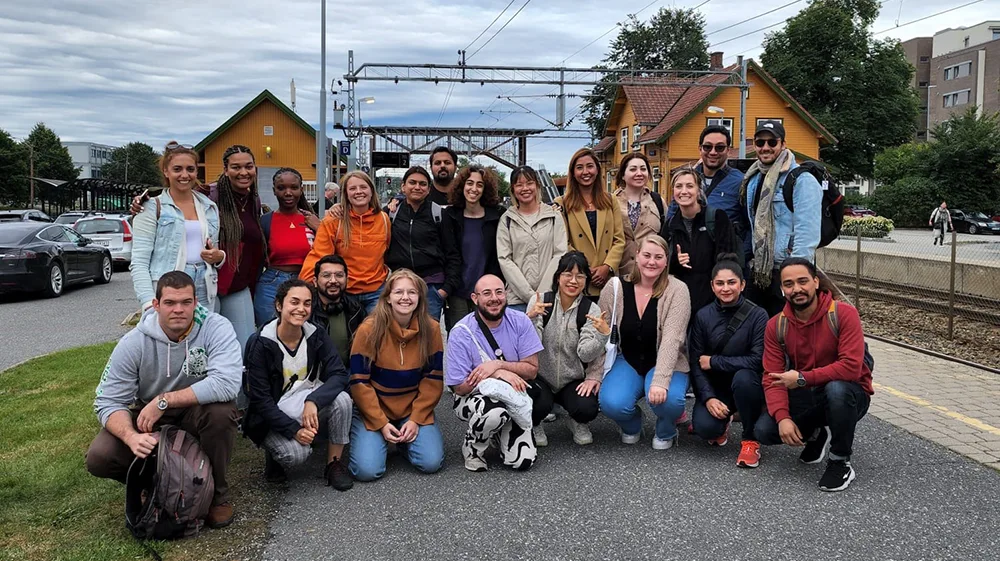– The master’s degree in International Community Health is unique because it offers multicultural and multidisciplinary classes that allow for cross-learning and sharing of experience among students, researchers, and lecturers, Elia Mmbaga says.
.jpg)
He is an Associate Professor at the Department of Community Health and Global Health at the University of Oslo, and the program leader of the ICH master’s program. He is also a former student and an alumni at the program.
– The ICH master’s is a research heavy program that gives emphasis and priority to community health challenges of global importance. In addition to training in important aspect of community health problems, the program gives students critical and relevant research skills required to study these challenges, Mmbaga says.
As part of the program students spend a whole semester doing research abroad, interacting with the community, as well as community health players.
International Community Health graduates are working in various fields internationally
The ICH program’s goal is to produce excellent researchers, educators, and practitioners.
– This has indeed been well achieved. Graduates from the master’s program in International Community Health have joined academia and research institutions as researchers, went to do clinical work, joined civil society organizations, UN organizations, and ministries of health as policy makers, such as center for disease prevention in the USA, Coalition for Epidemic preparedness innovation (CEPI), Save the Children, UNICEF, and others, Mmbaga says.
– This means that there is great potential to work on various fields and positions after completing the master’s program, he continues.
Students learn best practice from international researchers and practitioners
After completing his training in medicine and working as a clinician in Tanzania, Mmbaga saw that disease prevention was more effective in serving lives than treating the infectious diseases. Infectious diseases were the leading causes of death here, even though most were preventable.
– I wanted to pursue a master’s program that provided me with an opportunity to meet with health practitioners from other part of the world, so that I could learn from best practice. The master’s program in International Community Health was therefore a natural choice for me, Mmbaga says.
After graduating, Mmbaga moved back to Tanzania. He decided to join academia to transfer skills he learned during his master’s training to other researchers, and to conduct research to prevent diseases.
– I have trained many researchers at the Muhimbili University in Tanzania, for over 15 years. I have conducted research on HIV that have led to the development of HIV-prevention and care guidelines for the HIV at risk population in Tanzania. My work has also supported the development of the first cancer treatment guideline in Tanzania, he explains.
– The ICH master’s program provided me with an excellent platform for PhD training in epidemiology, which is a requirement to join academia in Tanzania, Mmbaga explains.
The skills he acquired as a student were also central to transfer his knowledge to others as a teacher, and to generate evidence as a researcher.
Mmbaga is doing infectious disease and cancer research in Tanzania
Mmbaga is involved in several research projects on HIV-prevention, establishing causes of cancer, esophageal and breast cancer, and reproductive health in developing countries, particularly in Tanzania.
– I am also working on projects aiming to build capacity for doctoral education, as well as developing a cancer research-training program in Tanzania, Mmbaga says.
– Given that infectious diseases continue to contribute to a large proportion of suffering and death in developing countries, addressing major infection such as the HIV-pandemic is crucial in improving population health in the region, he continues.
Research indicates that by 2030, non-communicable disease will surpass infectious diseases as causes of death and suffering in developing countries.
– It is therefore imperative that research on non-communicable diseases such as cancer are given priority. Identifying causes of common cancer types in the region, like esophageal and breast cancer, has been an important part of my research work, Mmbaga explains.
– The need for research to create local intervention in resource-limited countries like Tanzania is of paramount importance. My work on building cancer and other research training programs would go a long way in producing a cadre of researchers needed in the region, he says.
Apply for a master's degree in International Community Health at the University of Oslo
- Application deadline for non-EU/EEA citizens: 15 November
- Application deadline for EU/EEA citizens: 1 March
- Application deadline for applicants residing in Norway and Nordic citizens: 15 April
